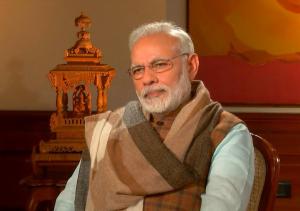Indian Express is breathless in rubbishing the recent utterance of Prime Minister Narendra Modi in the Parliament that “democracy in India wasn’t the work of Pt. Nehru….but that it was in ragon (veins) of Indians.” In last one week, Ashutosh Varshney and D.N. Jha have hogged Express’ edit pages to sneer at the Prime Minister and swoon at Pt. Nehru as the reason India has democracy.
We know too well the design of such anti-India forces to blacken our glorious heritage. You call them stooges of Western powers (for whom democracy originated from Greece) or the lackeys of Left (sworn enemies of Hinduism) but never forget the vileness of these forces. They don’t mean good of you or me or our future generations.
Varshney defines democracy as one of elected governments and universal adult suffrage, a typical Western notion. Who are we to tell him that Pt. Nehru’s own mentor, Mahatma Gandhi took a dim view of such a democracy! Gandhi saw better merit in “Republics of Village” – a direct democracy rather than a representative democracy—in which India abounded.
Varshney’s second line of propaganda is that ancient India may have had Councils (Gana or Sangha) through which a King governed but a common citizen had no role to play. Here’s what the eyewitness account of Alexander’s campaign to India in the 4th Century BCE by a Greek historian Arrian states: “ (there were) free and independent Indian communities at every turn”.
Greek writer Diodorus Siculus mentions that he mostly came across cities in India which practiced a democratic form of government.” The reference was from an account of no less than Greek traveler Megasthenes who had covered the entire Northern India and went as far as Patliputra.
Varshney probably hasn’t heard of Kautilya or his Arthashastra in the 4th Century BCE which mentions “janapadas” (Republic) where craftsmen, traders and agriculturalists had their guilds and wealth earned from trade ran the political process.
Panini, in his Sanskrit Classic “Ashtadhyayi” mentions the process of decision-making in politics. He provides various terms for voting and decision making through voting. He also mentions that in these Republics “there was no consideration of high and low.” The Buddhist literature in Pali and Brahmnical literature in Sanskrit portray a complex scenario of different groups managing their own affairs.
Indeed, the non-Monarchical governments in India go back to Vedic times. Rig Veda (10/191/2) mentions that “all resources to all stake-holders must be distributed equally.”
As for Pt. Nehru and his democratic credentials, his very appointment as Prime Minister was as undemocratic method as you could come across in any world annals. Nobody voted for him, yet he was made Prime Minister after majority’s favourite Sardar Vallabhbhai Patel bowed to the tyranny of Mahatma Gandhi.
And before touting for “democratic” Pt. Nehru, Varshney also ought to have informed the readers that the first Prime Minister of India had indeed jailed Majrooh Sultanpuri for his poem which didn’t paint him in golden colours. No wonder, his daughter Indira Gandhi went a step further and imposed Emergency.
So much for “freedom of speech” and “freedom of expression” which Varshney calls essentials in democracy.


